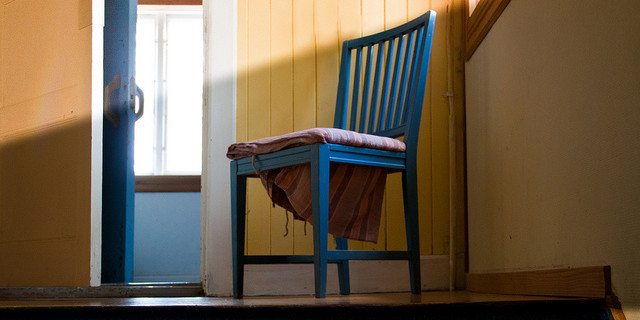
Get ready to think of a creative verb. Now, what action comes to mind when you look at the picture that heads this article? When you saw this chair, did you say “sit”? A Yale University study shows that you’re probably more creative if you said “stand” – the “distance” between a given noun and the verb you pair with it is a darn good measure of your overall creativity.
The study, published in the journal Behavior Research Methods, is pretty straightforward. It had 193 people take two tests: first, a traditional test of creativity and then a test that included 72 of these noun-verb pairs. Sure enough “distance” in noun-verb pairs matched scores on traditional creativity tests. (They had subjects take a couple more tests, too, to rule out explanations other than creativity.)
The crux was defining this “distance” between words. I mean, you probably understand intuitively that “stand” is farther than “sit” from the word “chair”, but how far is it, exactly? And how does your brain know this?
The answer is that after speaking and reading and listening for thousands and thousands of hours, your brain has built a massive database of words, contexts and meanings – you know how words are used, what words tend to go together, and what words are appropriate for certain situations.
Researchers at the University of Colorado at Boulder trained a supercomputer to do the same thing. The tool, called Latent Semantic Analysis, scans passages of text and evaluates how words are used in comparison and proximity with all the other words. For example, check out these two sentences:
- The quick brown fox jumps over the lazy dog.
- The fast brown fox leaps over the tired dog.
Latent Semantic Analysis would see that the word “quick” is pretty similar to the word “fast”. Same with “jump” and “leap”, and “lazy” and “tired”. You can do the same thing within a sentence: what does a fox do? Well, according to these sentences, it jumps and leaps. (Just as in a chair you sit.) Now imagine you had the data of thousands of sentences. Even if sometimes words were used in weird, counterintuitive or even wrong ways, over time the computer could sort out the meanings and relations.
After evaluating 2,000 pages of random English text, the tool passed the synonym portion of the Test of English as a Foreign Language (TOEFL). After “reading” an introductory psychology textbook, it passed the course’s multiple choice final exam. In this case, the LSA website knows that chair is 0.62 related to sit, but only 0.34 related to stand.
Here are a couple more relations:
Bicycle: Ride (0.53), Drive (0.33), Crash (0.23), Sleep (0.09), Eat (0.05)
Banana: Ride (0.14), Drive (0.13), Crash (0.13), Sleep (0.12), Eat (0.30)
Car: Ride (0.29), Drive (0.73), Crash (0.38), Sleep (0.06), Eat (0.05)
Bed: Ride (0.11), Drive (0.13), Crash (0.23), Sleep (0.72), Eat (0.11)
As you would expect, when people in this study free associated verbs in response to nouns, they came up with pairings like Taxi:Drive, Street:Walk, Dish:Wash, Artist:Paint, etc. You know, the run-of-the-mill reactions you would expect. It was the creative individuals that came up with farther-away, creative pairings between nouns and verbs. They also found that when they asked people to be creative, the subjects were, in fact, able to be more creative.
“Intrinsic factors do not account for the entirety of variability in creative performance,” the authors write.
It might seem obvious that people think more creatively when they’re told to. But it also means that no matter where you score on this or any other test of creativity, the amount of creative thought that you bring to any given situation depends as much on choosing to think creatively as it does on some intrinsic, natural gift. No matter how your brain is shaped by your genes and your experience, the next time you see a chair, you can choose to settle with “sit” or you can choose to think creatively about what other actions that chair could possibly propose.




Hello, I cannot locate the photographer of the photo you used. It is great. Please upload the full URL to their Flicker profile.
I’m not sure what to make of the fact that I said ‘grok.’
Ha! I love the ‘grok.’ Maybe your first impression was the need to make sense of the picture?
The word that came to my mind was “leave”. I saw that the door was wide open.